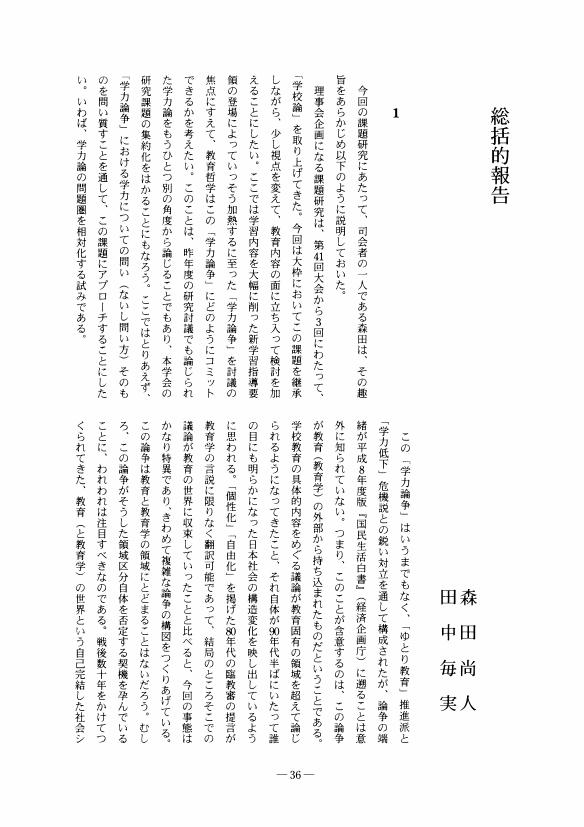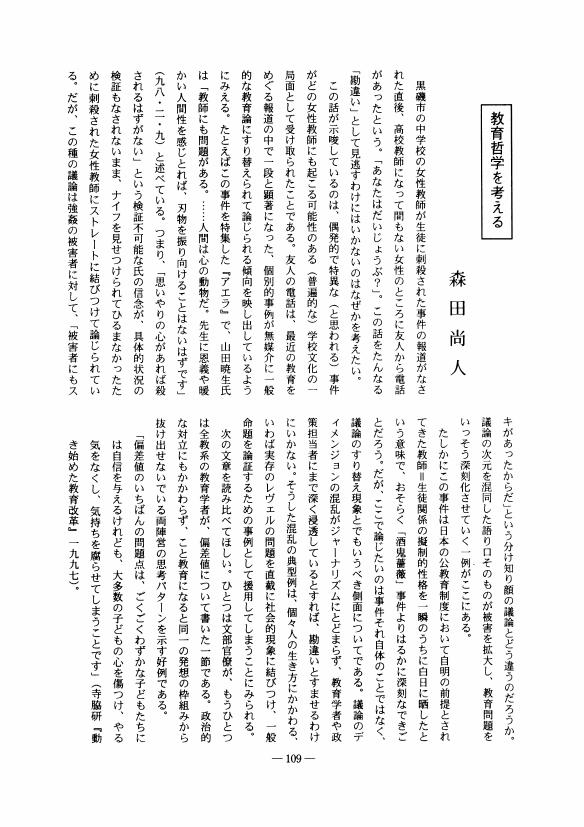- 著者
- 森田 尚人
- 出版者
- 日本大学教育学会
- 雑誌
- 教育學雑誌 (ISSN:02884038)
- 巻号頁・発行日
- vol.49, pp.53-74, 2014
- 著者
- 森田 尚人
- 出版者
- 日本大学教育学会
- 雑誌
- 教育學雑誌 (ISSN:02884038)
- 巻号頁・発行日
- vol.49, pp.53-74, 2014 (Released:2017-01-04)
- 被引用文献数
- 1
- 著者
- 森田 尚人
- 出版者
- 日本教育政策学会
- 雑誌
- 日本教育政策学会年報
- 巻号頁・発行日
- vol.18, pp.18-39, 2011
Professor Saburo Ienaga brought a set of suits against the textbook authorization system operated by the Ministry of Education as illegal and unconstitutional. Under the 1955 system the suits became an arena of ideological controversies as to who has the right to children's education, the state or people. The "People's right to education" camp argued that teachers of primary and secondary schools, as well as professors in higher institutions, should enjoy academic freedom of teaching. During the development of the trial, the justification for this argument changed. Emphasizing children's right to learn, in turn, they asserted freedom of teaching on the ground that teachers can provide education adapted to each child's stage of development. According to this theory, because education is a self-directed activity based on educational values, it therefore should avoid any intervention by government. Although apolitical it might seem, paradoxically, this theoretical transition intensified the political conflict between the two camps. The new standpoint of "people's right to education" did not make any modification of roles that teachers as laboring class should play in the nation's united front. The textbook trial as mass movement reflected the Japanese Communist Party's political strategy, which ordained the struggle against both American imperialism and half-subjugated Japanese monopoly capitalism as the primary purpose.
- 著者
- 森田 尚人
- 出版者
- 滋賀大学経済学会
- 雑誌
- 彦根論叢 (ISSN:03875989)
- 巻号頁・発行日
- no.第383号, pp.1-33, 2010-03
Izawa Shuji who was one of the leading educators in early modernJapan published a famous textbook on education that has been the firstbook titled “Pedagogy” in Japan. He also the first person who introducedevolution theory by translating T. H. Huxley’s On the Origin of Species. Although these works were frequently referred in textbooks on both historyof education and history of science, their contents and relations betweenthem have never been analyzed nor argued in their historical contexts. In 1875 Ministry of Education sent three young men to the UnitedState to investigate teacher training course in normal schools. Izawa wasadmitted to Bridgewater Normal School and studied under Albert G.Boyden whose transcript of a lecture provided the source of his Pedagogy.Examining Izawa’s handwritten notes, we find that Boyden’s lecture was profoundly influenced by Mark Hopkins’ An Outline Study ofMan. In this book Hopkins discussed psychological and ethical nature ofman from the standpoint of Scottish “common sense” philosophy, so Scot’s tradition of mental philosophy was reflected in Izawa’s Pedagogy.Nevertheless Hopkins who could not keep out of the impact of evolutionrecognized man as a organism and paved the way for Izawa’s acceptanceof evolution theory. After graduation Izawa went to Lawrence Scientific School at Harvard, where he studied a variety of subjects in natural science. Upon his return to Japan Izawa became head of Tokyo NormalSchool. Izawa’s faith in education as scientific thinking as well as morallyuplifting had its roots in contemporary American education. Izawawas expecting Japanese educators for acquiring scientific method and knowledge and applying them practically.
1 0 0 0 OA 教育学の「個人化」はいかにしてはじまったのか
- 著者
- 森田 尚人
- 出版者
- 教育哲学会
- 雑誌
- 教育哲学研究 (ISSN:03873153)
- 巻号頁・発行日
- vol.2005, no.92, pp.96-114, 2005-11-10 (Released:2009-09-04)
1 0 0 0 OA 小玉重夫著『シティズンシップの教育思想』
- 著者
- 森田 尚人
- 出版者
- 教育哲学会
- 雑誌
- 教育哲学研究 (ISSN:03873153)
- 巻号頁・発行日
- vol.2004, no.90, pp.67-69, 2004-11-10 (Released:2009-09-04)
1 0 0 0 OA 総括的報告
- 著者
- 森田 尚人 田中 毎実
- 出版者
- 教育哲学会
- 雑誌
- 教育哲学研究 (ISSN:03873153)
- 巻号頁・発行日
- vol.2002, no.85, pp.36-41, 2002-05-10 (Released:2009-09-04)
1 0 0 0 OA 小玉重夫著『教育改革と公共性-ボウルズ=ギンタスからハンナ・アレントへ-』
- 著者
- 森田 尚人
- 出版者
- 教育哲学会
- 雑誌
- 教育哲学研究 (ISSN:03873153)
- 巻号頁・発行日
- vol.2000, no.81, pp.138-148, 2000-05-10 (Released:2009-09-04)
1 0 0 0 OA 研究討議に関する総括的報告
- 著者
- 増渕 幸男 森田 尚人
- 出版者
- 教育哲学会
- 雑誌
- 教育哲学研究 (ISSN:03873153)
- 巻号頁・発行日
- vol.2000, no.81, pp.16-21, 2000-05-10 (Released:2009-09-04)
1 0 0 0 OA 教育哲学を考える
- 著者
- 森田 尚人
- 出版者
- 教育哲学会
- 雑誌
- 教育哲学研究 (ISSN:03873153)
- 巻号頁・発行日
- vol.1998, no.77, pp.109-110, 1998-05-10 (Released:2009-09-04)
1 0 0 0 OA 教育学における古典研究の意味
- 著者
- 森田 尚人
- 出版者
- 教育哲学会
- 雑誌
- 教育哲学研究 (ISSN:03873153)
- 巻号頁・発行日
- vol.1994, no.69, pp.34-39, 1994-05-10 (Released:2009-09-04)
- 参考文献数
- 16
1 0 0 0 IR 伊澤修二の『進化原論』と『教育学』を読む--明治初期教育学と進化論
- 著者
- 森田 尚人
- 出版者
- 滋賀大学経済学会
- 雑誌
- 彦根論叢 (ISSN:03875989)
- 巻号頁・発行日
- no.383, pp.1-33[含 英語文要旨], 2010-03
Izawa Shuji who was one of the leading educators in early modernJapan published a famous textbook on education that has been the firstbook titled "Pedagogy" in Japan. He also the first person who introducedevolution theory by translating T. H. Huxley's On the Origin of Species. Although these works were frequently referred in textbooks on both historyof education and history of science, their contents and relations betweenthem have never been analyzed nor argued in their historical contexts. In 1875 Ministry of Education sent three young men to the UnitedState to investigate teacher training course in normal schools. Izawa wasadmitted to Bridgewater Normal School and studied under Albert G.Boyden whose transcript of a lecture provided the source of his Pedagogy.Examining Izawa's handwritten notes, we find that Boyden's lecture was profoundly influenced by Mark Hopkins' An Outline Study ofMan. In this book Hopkins discussed psychological and ethical nature ofman from the standpoint of Scottish "common sense" philosophy, so Scot's tradition of mental philosophy was reflected in Izawa's Pedagogy.Nevertheless Hopkins who could not keep out of the impact of evolutionrecognized man as a organism and paved the way for Izawa's acceptanceof evolution theory. After graduation Izawa went to Lawrence Scientific School at Harvard, where he studied a variety of subjects in natural science. Upon his return to Japan Izawa became head of Tokyo NormalSchool. Izawa's faith in education as scientific thinking as well as morallyuplifting had its roots in contemporary American education. Izawawas expecting Japanese educators for acquiring scientific method and knowledge and applying them practically.
- 著者
- 森田 尚人 福田 由紀
- 出版者
- 日本認知心理学会
- 雑誌
- 日本認知心理学会発表論文集
- 巻号頁・発行日
- vol.2009, pp.149, 2009
鉄道利用環境の迷惑行為の低減に向けて、事業者は様々な対策を実施している。しかし、その対策は迷惑行為と遭遇しない場合でも実施されており、この影響について検討する研究は少ない。そこで本研究では、まず予備的な検討として、各迷惑事例を詳細な特性から把握する。通学に鉄道を利用する大学生39名に対し、別の調査で収集した迷惑行為27事例について「迷惑評価」に加え、「わざとやっている(故意性)」、「我慢できる」、「利用環境が悪くなる」といった側面からクラスター分析による分類を行った。その結果、3分類の採用が妥当と考え、それぞれ、乗車時マナー違反、自己中心的マナー違反、社会規範的マナー違反と命名した。この分類について、「鉄道係員への抑止要望」の評価から1要因の分散分析により比較したところ、主効果が有意であった(F(2,76)=235.3 p<.00)。多重比較の結果、社会規範的マナー違反(M=4.31,SD=1.07)は乗車時マナー違反(M=3.06,SD=1.02)よりも有意に高く、 自己中心的マナー違反(M=5.62,SD=0.81)は他の群よりも有意に高かった。すべての群間に有意な差がみられた。本研究で示された結果をもとに、今後の鉄道利用環境における具体的なマナー向上対策について検討していきたい。







